
While Thai children aged 3-12 who are diagnosed with vision problems by an ophthalmologist should receive corrective measures and free glasses annually under the Universal Coverage Scheme, data from the Equitable Education Fund (EEF) Thailand indicates that underprivileged children still encounter obstacles in accessing essential services such as vision testing, referrals for children with vision issues, and obtaining glasses from hospitals, primarily due to high associated costs such as transportation expenses.

Vision health issues present significant barriers to learning and may result in children dropping out of the education system. To address this challenge, the Equitable Education Fund (EEF) Thailand, National Health Security Office (NHSO), and the Optometry Association of Thailand have initiated the ‘I SEE THE FUTURE’ project in collaboration with three provinces: Pattani, Surin, and Samut Songkhram. The project aims to establish a local mechanism that serves as a model for the country, ensuring every child has prompt access to healthcare rights. The NHSO encourages all provinces nationwide to propose healthcare plans under the Community Health Security Fund to assist in covering expenses related to transporting students to hospitals for services such as diagnosis, obtaining glasses, and undergoing eye examinations every six months.
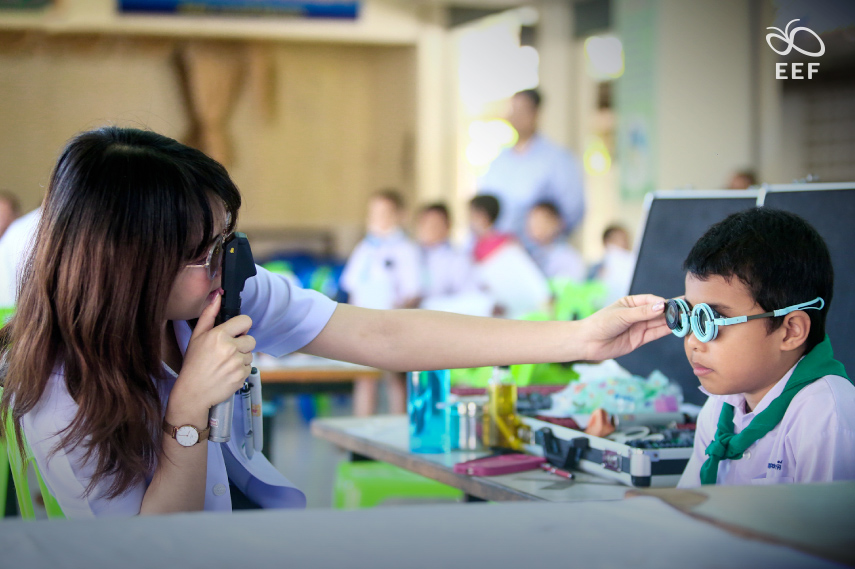
The Equitable Education Fund (EEF), in partnership with the National Health Security Office (NHSO) and the Optometry Association of Thailand, collaborated with the local education management authority in Samut Songkhram, the governor of Samut Songkhram Province. The municipalities of Mueang Samut Songkhram and Amphawa District in Samut Songkhram Province organized the ‘I SEE THE FUTURE: Just Seeing Can Change the Future’ project. This innovative vision screening initiative was held on National Children’s Day 2024 at Municipal School 2 (Wat Kasem Oranaram) in Samut Songkhram Province.
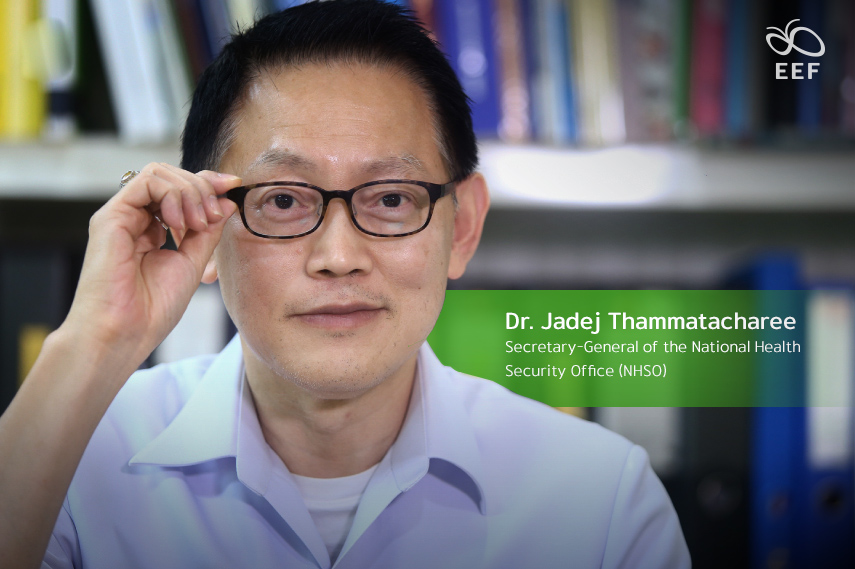
Dr. Jadej Thammatacharee, Secretary-General of the National Health Security Office (NHSO), stated that untreated vision impairments in children can directly obstruct and impact educational opportunities and learning quality. This hindrance prevents children from fully developing their learning potential, leading to long-term learning problems, potential dropout from the education system, and ultimately affecting their future.
The NHSO has provided comprehensive health services to Thai people nationwide, including medical care, health promotion, and disease prevention. For vision problems, Thai children aged 3-12 who ophthalmologists confirm to have vision abnormalities are eligible to receive corrective measures, including glasses, at no cost as part of their health benefits since 2021. However, it has been found that some groups, such as underprivileged children, still lack the financial resources and opportunities to access screening and treatment services for vision abnormalities.
Dr. Thammatacharee stated that the National Health Security Office (NHSO), in collaboration with the Equitable Education Fund (EEF) Thailand and the Optometry Association of Thailand, has initiated the ‘I SEE THE FUTURE’ project. This project aims to promote local authorities as mechanisms that bridge the work of public health and education networks in the area, helping underprivileged children access appropriate health benefits and rights, starting with addressing vision problems.
“The NHSO will notify local administrative organizations nationwide that we are ready to support them in developing health plans focused on eye care for children. We will create mechanisms to coordinate agencies, organizations, and networks to address this problem. Additionally, we will raise awareness about accessing health benefits from the Community Health Security Fund to support expenses for taking students to hospitals for services such as diagnosis, receiving glasses, and undergoing eye examinations every six months,” said Dr. Thammatacharee.
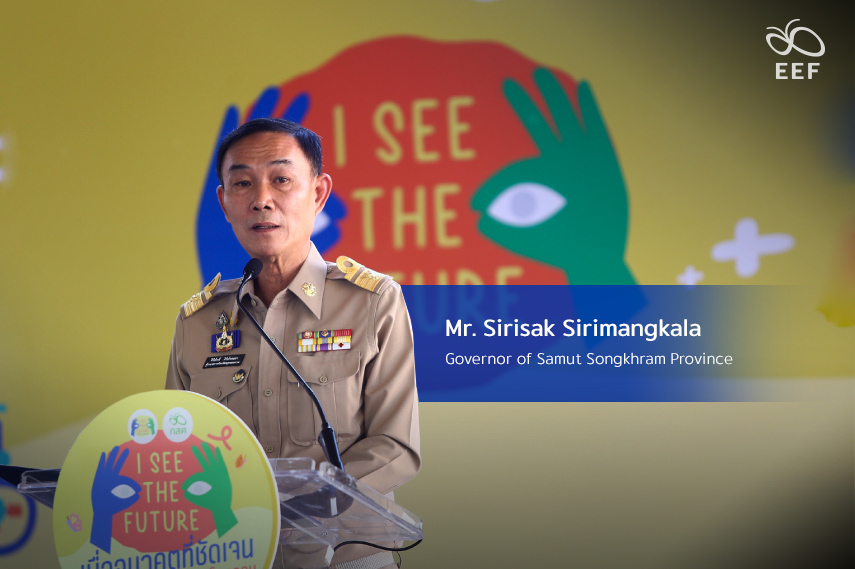
Mr. Sirisak Sirimangkala, Governor of Samut Songkhram Province, stated that vision problems are an important issue that requires genuine collaboration from all stakeholders. He emphasized the need to create sustainable and comprehensive care mechanisms. He noted that it is pleasing that the ‘I SEE THE FUTURE: Just Seeing Can Change the Future’ project by the NHSO has selected Samut Songkhram Province as one of the piloting provinces. This project will help the province establish mechanisms to integrate the work of relevant agencies in promoting eye health care for children and youth, especially for underprivileged groups who are vulnerable and require comprehensive and inclusive care.
The Samut Songkhram Governor also added that after this campaign, Samut Songkhram Province will convene meetings with relevant agencies in the area to drive forward these mechanisms at the provincial level.
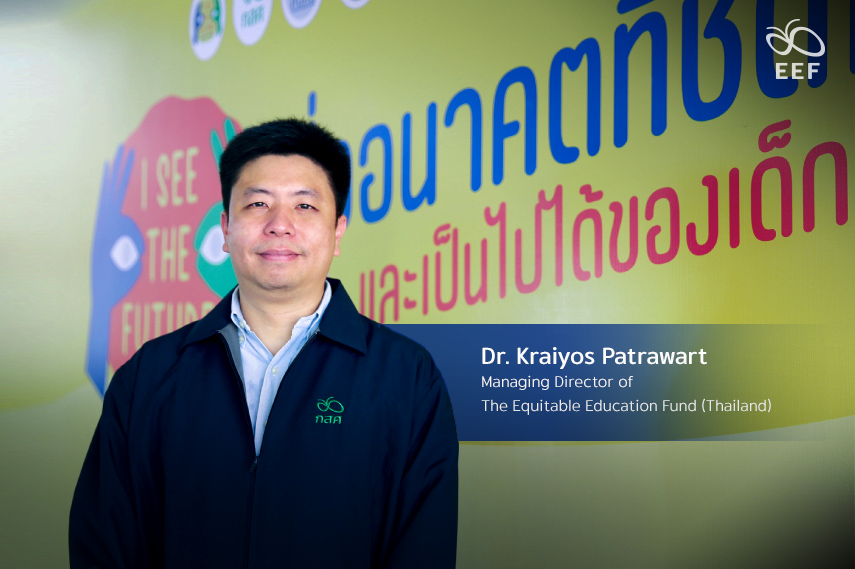
Dr. Kraiyos Patrawart, Managing Director of the Equitable Education Fund, stated that data from the ‘Chad Jaew’ (Clear Vision) Project, organized under the Health Intervention and Technology Assessment Program (HITAP), indicates that among Thai children aged 3 to 12, up to 4.1% require vision screening and glasses. If not provided with glasses or appropriate eye care, children in this group are at risk of developing amblyopia or blindness. This 4.1%, compared with the target population of the NHSO for the same age group based on 2020 data, suggests there may be up to 50,000 underprivileged or special needs children who urgently need glasses.
However, research by the Equitable Education Fund (EEF) Thailand has found that underprivileged children still face problems accessing services such as vision screening, referrals for treatment of vision abnormalities, and receiving glasses from hospitals due to associated costs, such as transportation expenses to provincial hospitals. Some even have to bear the cost of traveling to see a doctor at hospitals several tens of kilometers away, costing over 900 Thai baht.
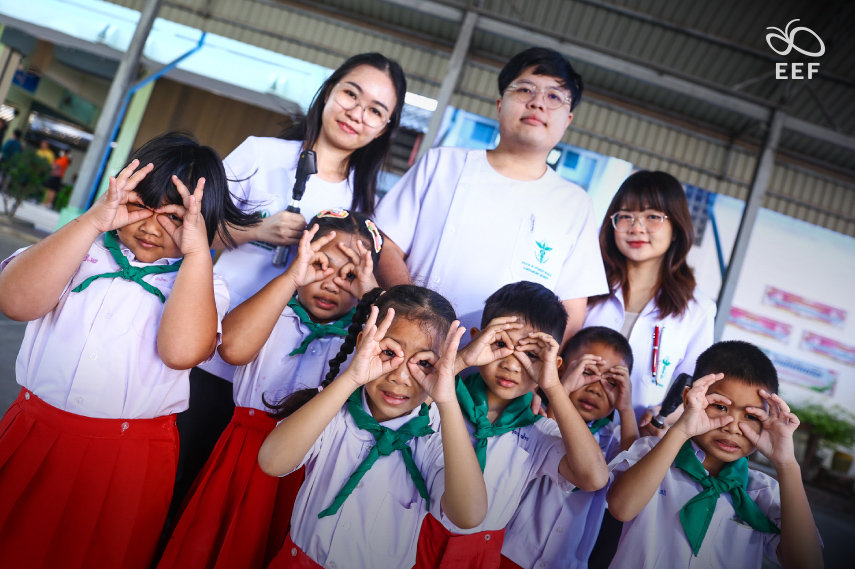
The EEF Managing Director stated that the I SEE THE FUTURE project has devised a model to tackle these challenges. It supports local authorities as hosts to foster collaboration in the area and develops proposals to request budget support from the Community Health Security Fund to promptly assist underprivileged children and youth in accessing vision screening services, treatment, and glasses. The project will conduct vision screening activities before providing glasses to children with vision abnormalities and will collect data to assess their learning outcomes after receiving glasses. This model will be implemented in the pilot areas of three provinces: Pattani, Surin, and Samut Songkhram, targeting over 15,000 children. It is estimated that approximately 2,000 targeted students will receive glasses following implementation.
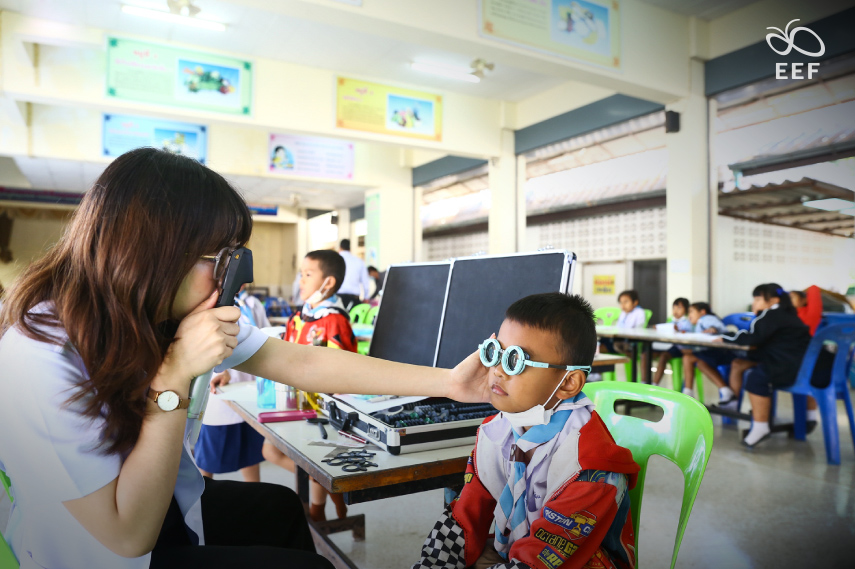
The EEF and the Optometry Association of Thailand research team will collaborate with local authorities in all three provinces to develop health plans that facilitate access to education and establish robust health and education networks in the area. The long-term goal is to implement vision screening and referral processes for children with vision problems.
“Thailand offers numerous health benefits and entitlements, but underprivileged children often lack access to these benefits. This initiative aims to close the gap in the system that contributes to educational disparities, as health issues are one of the reasons children drop out of the education system.”
“Dr. Kraiyos Patrawart stated that this initiative will help schools reduce the burden of vision screening and providing glasses to children with vision abnormalities. Additionally, it will involve developing screening tools to educate health volunteers, teachers, and parents in recognizing early symptoms, as well as facilitating the use of updated and user-friendly vision health measurement tools.”
“The Local authorities will have experts to oversee the long-term vision health of children and youth in the community to create a social protection system for sustainable educational equality, increasing access to education for underprivileged children and youth in all areas.”
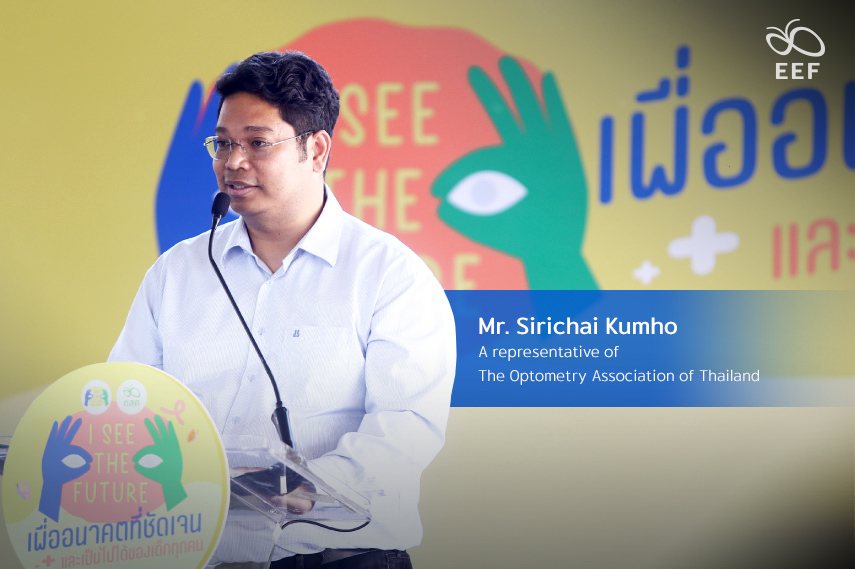
Mr. Sirichai Kumho, a representative of the Optometry Association of Thailand, emphasized the importance of addressing children’s vision problems. If not corrected or managed properly, vision problems in children can escalate rapidly and increase as they grow yearly. The rising prevalence of vision problems can stem from several factors, such as elongated eyeballs, which elevate the risk of eye diseases. If left unaddressed, these issues can detrimentally impact children’s vision and learning capacities, often without them recognizing the abnormality of their experiences. Since children commonly assume that the visual issues, they encounter are normal for themselves, the evident consequence is a decline in the child’s learning ability.
“Parents, teachers, and caregivers can observe early signs, such as a child’s reluctance to play actively, climb, or venture outdoors, or they may frequently squint when looking at the blackboard in the classroom. Upon noticing these symptoms, they should contact local community organizations or nearby healthcare facilities for initial vision screening and subsequent treatment procedures.”

